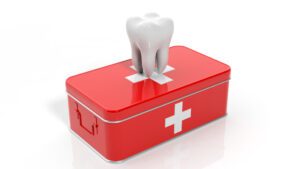Dental emergencies can happen at any time, and they can be both painful and stressful. From a broken tooth to a knocked-out tooth, dental emergencies require prompt attention to prevent further damage and reduce the risk of infection.

Toothache
A toothache can be caused by a variety of issues, including cavities, gum disease, and an abscess. To relieve the pain, rinse your mouth with warm salt water and take over-the-counter pain medication. If you have extreme or constant pain, you should contact your dentist. Pain is an indicator that something is wrong.
Broken or Chipped Tooth
A broken or chipped tooth can be caused by a variety of accidents or incidents, such as a fall or biting down on something hard. Rinse your mouth with warm salt water and apply a cold compress to the affected area to reduce swelling. If possible, save any broken pieces of tooth and contact your dentist.
Knocked-Out Tooth
A knocked-out tooth is a dental emergency that requires immediate attention. If possible, retrieve the tooth and hold it by the crown (top part), not the root. Rinse the tooth with water and try to reinsert it into the socket. If this isn’t possible, place the tooth in a container of milk and contact your dentist right away. To increase your chances of saving your tooth, you need to get to your dentist within an hour.
Abscess
An abscess is a painful swelling that is caused by an infection. It can occur at the root of a tooth or in the gums. Also, rinse your mouth with warm salt water and take over-the-counter pain medication to relieve the pain. Contact your dentist immediately to schedule an appointment.
Lost Filling or Crown
A lost filling or crown can cause pain and sensitivity. Rinse your mouth with warm salt water and try to reinsert the crown with dental cement or toothpaste. Repairing a filling or dental crown to prevent tooth decay or infection is important.
Soft Tissue Injuries
Soft tissue injuries, such as cuts, tears, or lacerations to the lips, cheeks, or tongue can be painful and bleed profusely. Apply pressure with a clean, damp cloth to stop the bleeding. Rinse your mouth with salt water and apply a cold compress to reduce swelling. If the bleeding doesn’t stop, seek medical attention immediately.
During An Emergency
In all cases of dental emergencies, it’s important to contact your dentist as soon as possible. Prompt attention can help prevent further damage, reduce the risk of infection, and relieve pain. If your dentist is not available, seek emergency medical attention or go to the nearest emergency room.
In addition, it’s important to take steps to prevent dental emergencies. This includes practicing good oral hygiene, wearing a mouthguard during contact sports, avoiding hard or sticky foods that can damage teeth, and visiting your dentist regularly for checkups and cleanings. As a result, you can minimize your risk of dental emergencies.
Taking steps to prevent dental emergencies can help ensure good oral health and prevent future emergencies.
